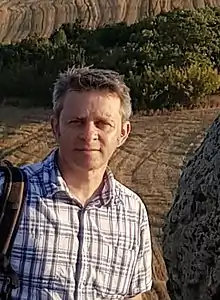David Wengrow
David Wengrow (born 25 July 1972) is a British archaeologist and Professor of Comparative Archaeology at the Institute of Archaeology, University College London.[1]
David Wengrow | |
|---|---|
 | |
| Occupation | Archaeologist, Author, Professor |
| Nationality | British |
| Education | BA, Mst, University of Oxford Ph.D, University of Oxford |
| Subject | Archaeology |
Education
Wengrow enrolled at the University of Oxford in 1993, obtaining a BA in archaeology and anthropology.[2] He went on to qualify for an MSt in world archaeology in 1998 and then studied for a D.Phil. under the supervision of Roger Moorey completed in 2001.[3] Andrew Sherratt was a notable influence during Wengrow's time at Oxford.[4]
Academic career
Between 2001 and 2004 Wengrow was Henri Frankfort Fellow at the Warburg Institute and Junior Research Fellow at Christ Church, Oxford; he was appointed to a lectureship at the UCL Institute of Archaeology in 2004, and in 2011 was made Professor of Comparative Archaeology (a title formerly held by Peter Ucko).[5] Wengrow has conducted archaeological excavations in Africa and the Middle East, most recently with the Sulaymaniyah Museum in Iraqi Kurdistan.[6] He is the author of three books and numerous academic articles on topics including the origins of writing, ancient art, Neolithic societies, and the emergence of the first states in Egypt and Mesopotamia.[7] In 2020, Wengrow completed a major work on the history of inequality with LSE anthropologist David Graeber just three weeks prior to Graeber's untimely death, as recorded in Wengrow's tribute to his long-time co-author.[8] 'The Dawn of Everything: A New History of Humanity' is expected to be published in Fall, 2021.[9]
Honours
Wengrow is a recipient of the Antiquity Prize[10] and has delivered the Rostovtzeff Lectures (New York University),[11] the Jack Goody Lectures (Max Planck Institute)[12] and the Biennial Henry Myers Lecture (Royal Anthropological Institute of Great Britain).[13] He served as external coordinator of the Mellon Research Initiative at New York University's Institute of Fine Arts[14] and was Distinguished Visitor at the University of Auckland.[15]
Selected publications
Books
- Wengrow, D. (2006). The Archaeology of Early Egypt. Social Transformations in North-East Africa, 10,000-2650 BC. Cambridge World Archaeology Series. Cambridge: Cambridge University Press.
- Wengrow, D. (2010). What Makes Civilization? The Ancient Near East and the Future of the West. Oxford & New York: Oxford University Press.
- Wengrow, D. (2014). The Origins of Monsters. Image and Cognition in the First Age of Mechanical Reproduction. Princeton: Princeton University Press
Short essays
References
- UCL Homepage
- UCL Institute of Archaeology, D. Wengrow 'Education and biography'
- Obituary Roger Moorey, (1937 – 2004) The British Academy
- J. O'Shea, S. Shennan and D. Wengrow, 'Andrew Sherratt Remembered', Antiquity Sep 2006, Vol.80 (309), pp.762-766
- Wengrow, Education and Biography as listed by University College London, 1.1.2020
- Field report, 'New excavations in the Shahrizor Plain, Iraqi Kurdistan. Iraq (2016) 78: 253–284
- https://ucl.academia.edu/DavidWengrow
- Harper, Annie; Read, Mark; Herrine, Luke; Neary, Dyan; Liu, Yvonne Yen; Bookchin, Debbie; Jordan, John; Frémeaux, Isabelle; Ross, Andrew; Wengrow, David; Sahlins, Marshall (2020-09-05). "David Graeber, 1961–2020". The New York Review of Books. Retrieved 2020-09-15.
- "'Inspirational' activist author David Graeber dies". www.penguin.co.uk. Retrieved 2020-09-15.
- The Antiquity Prize, list of past winners
- The Rostovtzeff Lectures, list of past recipients, New York University, Institute for the Study of the Ancient World
- The Jack Goody Lectures, list of past recipients, Max Planck Institute for Ethnology and Social Anthropology
- The Henry Myers Lecture, past recipients, Royal Anthropological Institute of Great Britain
- Mellon Research Initiative, Homepage, New York University, Institute of Fine Arts
- Announcement (UCL), 'David Wengrow named as Distinguished Visitor, University of Auckland, 2019